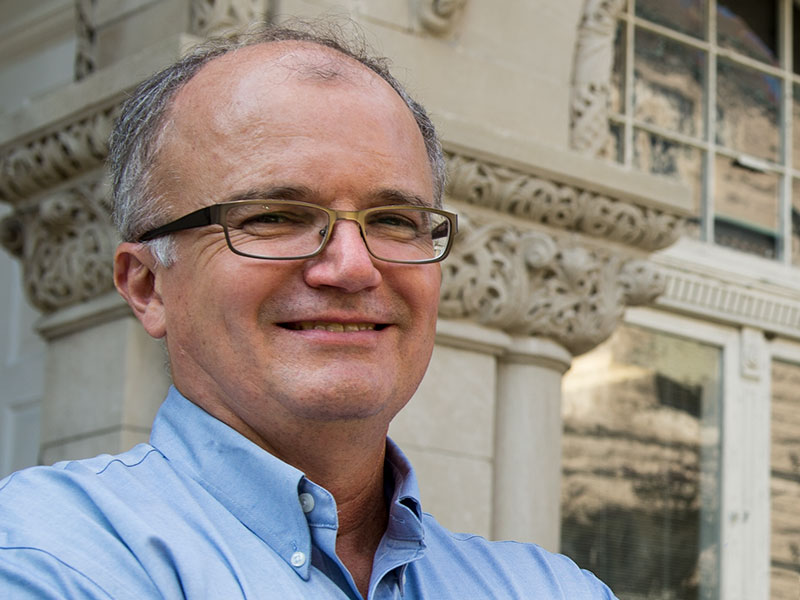Jonathan B. Pritchett
Associate Professor of Economics

Biography
Jonathan Pritchett is Associate Professor of Economics at Tulane University. He received a Ph.D. in Economics from the University of Chicago in 1986. His research concerns the economic history of slavery and the U.S. interregional slave trade. He develops and analyzes large computerized databases using information found in original manuscript sources. His research includes the effects of sample selection bias and the measured heights of slaves, the distribution of occupations held by slaves, the stability of slave families, adverse selection in the market for slaves, the business reputations of slave traders, and the political economy of the U.S. Civil War. He has also studied the economic history of hospital care for slaves and the effects of yellow fever epidemics in antebellum New Orleans. His current research concerns the use of slaves as collateral on loans.
Publications
Selected Publications
- Charles W. Calomiris and Jonathan Pritchett, "Betting on Secession: Quantifying Political Events Surrounding Slavery and the Civil War," American Economic Review, 106(1) (January 2016), pp. 1–23. [pdf]. Also NBER working paper 19625. [pdf]. Some press about our work: AEA, Slate, Pacific Standard and History News Network.
- Jonathan Pritchett and Jessica Hayes,* "The Occupations of Slaves Sold in New Orleans: Missing Values, Cheap Talk, or Informative Advertising?" Cliometrica, 10(2) (March 2016), pp. 181-195. [pdf].
- Jonathan Pritchett and Herman Freudenberger, “A Peculiar Sample: a reply to Steckel and Ziebarth,” Journal of Economic History, 76(1) (March 2016), pp. 139-162. [pdf].
- Jonathan Pritchett and Mallorie Smith, “Sequential Sales as a Test of Adverse Selection in the Market for Slaves,” Journal of Economic History, 73 (June 2013), pp. 479-499. [pdf].
- Charles Calomiris and Jonathan Pritchett, “Preserving Slave Families for Profit: Traders’ Incentives and Pricing in the New Orleans Slave Market,” Journal of Economic History 69 (December 2009), pp. 986-1011. [pdf]. Also NBER working paper 14281. [pdf].
- Jonathan B. Pritchett and Myeong-Su Yun, “The In-hospital Mortality Rates of Slaves and Freemen: Evidence from Touro Infirmary, New Orleans, Louisiana, 1855-1860,” Explorations in Economic History 46 (April 2009), pp. 241-252. [pdf].
- Kevin Lander and Jonathan Pritchett, “When to Care: The Economic Rationale of Slavery Health Care Provision,” Social Science History 33 (Summer 2009), pp. 155-182. [pdf].
- Jonathan B. Pritchett, “Quantitative Estimates of the United States Interregional Slave Trade, 1820-1860,” Journal of Economic History 61 (June 2001), pp. 467-475. [pdf].
- Jonathan B. Pritchett, “The Interregional Slave Trade and the Selection of Slaves for the New Orleans Market,” Journal of Interdisciplinary History 28 (Summer, 1997), pp. 57-85. [pdf].
- Insan Tunali and Jonathan B. Pritchett, “Cox Regression with Alternative Concepts of Waiting Time: The New Orleans Yellow Fever Epidemic of 1853,” Journal of Applied Econometrics 12 (Jan.–Feb., 1997), pp. 1-25.[pdf].
- Jonathan B. Pritchett and Insan Tunali, “Strangers' Disease: Determinants of Yellow Fever Mortality During the New Orleans Epidemic of 1853,” Explorations in Economic History 32 (October, 1995), pp. 517-539. [pdf].
- Jonathan B. Pritchett and Richard M. Chamberlain, “Selection in the Market for Slaves: New Orleans, 1830-1860,” Quarterly Journal of Economics 108 (May, 1993), pp. 461-473.[pdf].
- Jonathan B. Pritchett and Herman Freudenberger, “A Peculiar Sample: The Selection of Slaves for the New Orleans Market,” Journal of Economic History 52 (March, 1992), pp. 109-127. [pdf].
- Herman Freudenberger and Jonathan B. Pritchett, “The Domestic United States Slave Trade: New Evidence,” Journal of Interdisciplinary History 21 (Winter, 1991), pp. 447-477. [pdf].
- Jonathan B. Pritchett, “The Burden of Negro Schooling: Tax Incidence and Racial Redistribution in Postbellum North Carolina,” Journal of Economic History 49 (December, 1989), pp. 966-973. [pdf].
- Jonathan B. Pritchett, “The Term of Occupancy of Southern Farmers in the First Decades of the Twentieth Century,” Historical Methods 20 (Summer, 1987), pp. 107-112. [pdf].
- Jonathan B. Pritchett, “North Carolina's Public Schools: Growth and Local Taxation,” Social Science History 9 (Fall, 1985), pp. 277-291. [pdf].
Forthcoming
- Trevon Logan and Jonathan Pritchett, "On the Marital Status of U.S. Slaves: Evidence from Touro Infirmary, New Orleans, Louisiana," Explorations in Economic History, (forthcoming), [pdf].
Working Papers
- Jonathan B. Pritchett and Myeong-Su Yun, “A Safety Net for Slaves? Public hospital care for slaves in New Orleans, 1855-1860,” Tulane University, pp. 1-30. [pdf]
- Jonathan B. Pritchett and Mallorie E. Smith, “An Economic Analysis of Slave Warranties: the 1830 New Orleans slave market,” Tulane University, pp. 1-29. [pdf]
- Jonathan Pritchett, "Demographic Causes and Consequences of the Interregional Slave Trade: The Slave Breeding Hypothesis." Working Paper, Tulane University, pp. 1-42.
